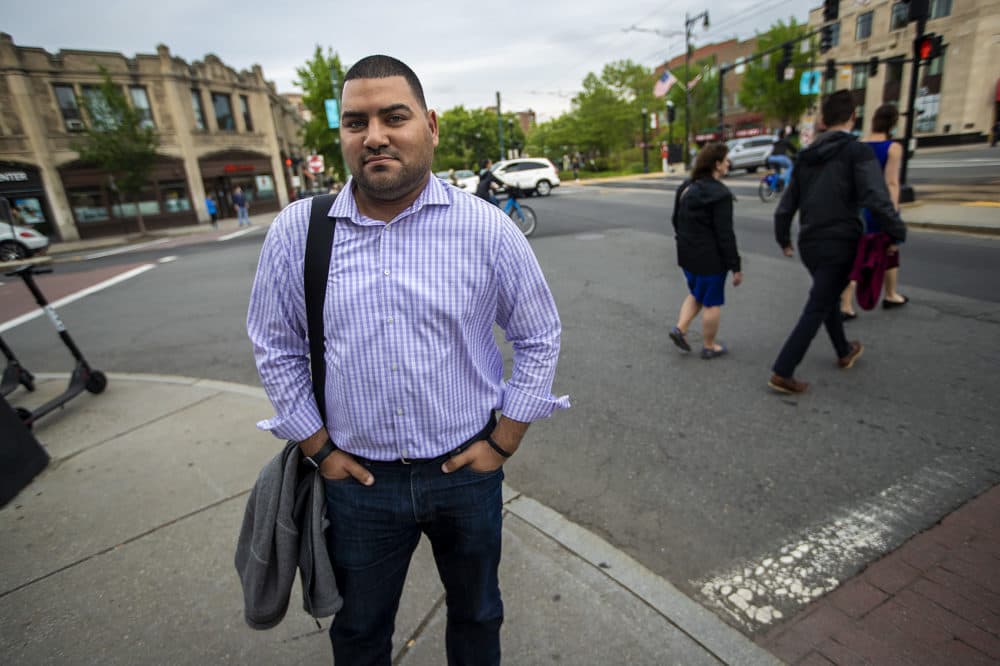Advertisement
After Allegations Of Racism, Some Say Brookline Is Turning A Corner
Resume
Raul Fernandez grew up in New York City, but now he's looking to shake up the government of Brookline. Last month, the Boston University professor was elected as the Brookline Select Board’s first Latino member.
The issue of how town government deals with allegations of racism isn't the only reason Fernandez ran. But his campaign was marked by his commitment to bring the issues he works on at BU — he’s an associate dean of diversity and inclusion — to the fore of town government.
"The bet that we made in our campaign is that residents in Brookline want to do that work and want to be pushed in this domain in terms of thinking about racial equity,” Fernandez said. "And I think that we bet right. We bet on Brookline and Brookline said, 'OK, let's do this.’ ”
Brookline has been grappling for years with allegations of racism from black and Hispanic employees and residents. A civil rights lawsuit in federal court, originally filed on behalf of nine people, charges town officials with "enforcing racial subordination … and retaliating against persons who protest racial discrimination.”
Now, with the election of Fernandez and a recent town meeting vote in favor of a black firefighter, some Brookline residents are ready for the town to change the way it deals with allegations of racism. But other residents say real change isn’t going to come with an election, but with a new generation of leadership.
A 2-To-1 Vote To Apologize
Growing up in the subsidized Taino Towers in Spanish Harlem and later the South Bronx, the Puerto Rican Fernandez would become the first in his family to graduate from college.
He was elected to the Brookline Select Board in May. The first big test of his leadership was at town meeting last week. The proposal: an apology on behalf of the town to Gerald Alston, a firefighter who nine years ago was on the receiving end of a racial slur by his supervisor, and who remains mired in litigation.
"Some have advocated waiting until this case is resolved to apologize to Mr. Alston,” Fernandez said at the dais. "Some have even said that we shouldn't give an apology away for free when it can be part of a settlement agreement. … I hope we teach our kids that apologies ... should be given when they're due, not when it's most convenient to the transgressor.”
Fernandez said he didn't get elected to continue defending the town in the nearly decade-old discrimination case — but to help resolve it.
"I don't know about you, but I'm not confident that the town will win this case,” he said. "And frankly I don't think we should.”
After a fierce debate over whether the town should apologize to Alston, the measure passed by a nearly 2-to-1 margin.
Brookline’s town meeting was the latest milestone in the nearly decade-long saga of Alston and at least five others who have sued the town over allegations of racism at the hands of town officials — including the police and fire departments, as well as public works and the select board.
It began in 2010, when Alston received a now-infamous voicemail from his supervisor, Lt. Paul Pender. “Fucking [n-word],” Pender said on the voicemail, an excerpt of which was provided to WBUR by Alston’s attorney.
WBUR attempted to reach Pender this week but received no response. But he told investigators in 2017 he’d inadvertently left the voicemail during a traffic incident — that his remark was aimed at a black or Latino driver who didn’t give him the right of way.
But Alston, who was out on medical leave at the time, still believes the slur was directed at him for being on leave.
Sitting next to his attorney at a co-working space on Beacon Street, Alston laid out his grievances against the town, which have roots in his teenage years.
“Growing up in Roxbury and Dorchester, it was well known: If you are a teenager or a young adult, that entering in Brookline in any way shape or form … you was going to run into a problem,” he said.
Since he came out against his lieutenant, Alston has said the town ruined his life by failing to deal with the race issue. He was terminated by the town in 2016, while in contrast, the man who used the slur was promoted to captain and later temporary deputy chief before his recent retirement.
Some in town say Alston is far from a sympathetic figure. He had a troubled history with the department, allegedly using cocaine while employed by the town and at one point threatening to “go postal” on his colleagues. In its legal filings, the town argues that the threat of violence violated Brookline’s workplace safety rules, and that Alston's firing was justified.
(In February, Alston was reinstated following a ruling from the Massachusetts Civil Service Commission.)
Pender, meanwhile, was well-loved by firefighters, and was even commended by then-U.S. Attorney General Eric Holder for his valor during a blaze in 2008. The town says Pender was punished for using a racial slur, and that his promotion was justified in part because of rules governing the promotion of public employees.
Without discussing any of the Alston case, the majority of town meeting members voted to apologize to Alston for the way the town has handled the case.
'There Is Racism Everywhere'
For Arthur Conquest, a town meeting member and civil rights activist, the vote was a cause for joy.
“OK, so that’s the first step,” Conquest said outside the auditorium. “The biggest problem that we have is whether or not black people and Latino people are going to come together and stand up, and face this [fear]. There’s a lot of fear … that there will be reprisals against them, and I think that’s an issue that we have to address.”
Conquest has been fighting for equal rights in Brookline since he moved there in 1982. And though he’s inspired by Fernandez's election and the town meeting vote, he says the need for change is as great now as it was in when he moved to town. Conquest says that need was evident on election day, when he had a run-in with the warden at his polling place.
"She said, 'What are you doing here?' And I said, 'I just want to get a pen so I can write down the results of the election … and she said to me, 'What if you don't give ... back the pen?' And I said, 'That's ridiculous. Why would I want to take a cheap pen?' And the next thing I know, the policeman was on my left-hand side."
Brookline Town Clerk Patrick Ward told WBUR he’s looking into Conquest’s complaint. But Ward said he doubts it had anything to do with race, and that Conquest was probably in an area that was restricted to the public.
Conquest says that might be true, but if race had nothing to do with it, why would he, a 75-year-old town meeting member, be questioned about stealing a pen?
"I'm just concerned that it's always the police, that … I can't go to the bank without the police being called," he said. "I can't walk through the high school without security stopping me. It’s like there's something suspicious or nefarious about a black man.”
Some say the cases have tarnished Brookline's reputation as an enlightened town with some of the best schools and most successful residents in the state.
But is that fair to the town?
“There is racism everywhere in America, everywhere in Massachusetts,” said town meeting member and attorney Martin Rosenthal. “I'm sure there is some in Brookline, but I don't think it's any worse than other places in Massachusetts."
Rosenthal pointed to a recent report from the Brookline Police Department, which states that it is "widely considered a national leader in addressing the occurrence, and perception of, biased policing."
The report shows a disparity in the races of people who interact with Brookline police. In 2018, 50% of people subject to field interrogations were black or Latino, while 39% were white. Three-quarters of people interrogated were non-residents.
“I’m very proud of this community. We work hard on these issues, and we continue occasionally to make mistakes,” said Rosenthal, who is representing one of the defendants in the Alston case. "I don't think you can eliminate mistakes, or racial mistakes, in my lifetime. Maybe in the next generation.”
Rosenthal said that in large part, Brookline’s race issues are rooted in income inequality. In a town with the highest cost of housing in Massachusetts, he said it’s become prohibitively expensive for many people of color to move to Brookline.
Neil Wishinsky, who headed the select board the last four years before deciding not to run last month, said it’s “regretful” that Brookline has been portrayed as racist.
"I think our record is better than that reputation,” he said.
Wishinksy is named in the Alston suit — accused of discrimination both in his capacity as board chair, and as a private citizen — and he’s been at the helm of several contentious meetings in which he’s been held to task for his handling of Alston’s employment and legal matters.
"I look back at my whole life and my career and [the charge of discrimination] is against everything that I've worked for and stood for in my life,” Wishinsky said. "You know, it's very difficult to be sitting in the front of a room and having 200 people yelling that you're a racist. That's probably one of the most difficult things I've had happen to me in my life.”
A month after leaving the board, Wishinsky said his biggest regret is not being able to get the Alston case resolved.
One thing he can say he accomplished is hiring a new fire chief, John Sullivan, who, notably, spent his career in Worcester, not Brookline.
“There's a general heaviness that the department feels ... there is a weight that the department carries and is looking for resolution,” said Sullivan, who's headed the department for over a year now.
Sullivan says he hopes the culmination of Alston’s suit against the town will bring that resolution. In the meantime, he says his mission is clear: Help bring more diversity to the department, and offer more training on things like racial sensitivity.
“That's where the challenge is for me as the new chief — as the chief who's going to hopefully transition us through this difficult period — to learn and understand each other so that we can have a more tolerant, and inclusive, and diverse workplace,” he said.
Asked what's the big lesson he hopes to instill in his firefighters, Sullivan said it's simple: Treat others the way you want to be treated.
Correction: Due to an editing error, an earlier version of this story had the wrong hometown for Raul Fernandez. We regret the error.
Editor's Note: This story has been updated to add that the Massachusetts Civil Service Commission ruled that the town was not justified in firing Alston.
This article was originally published on June 07, 2019.
This segment aired on June 7, 2019.

